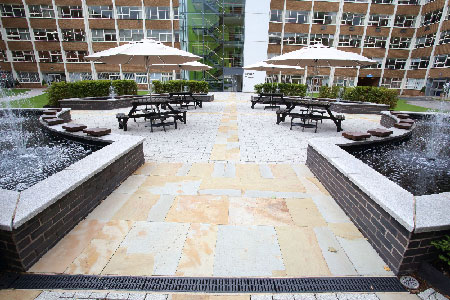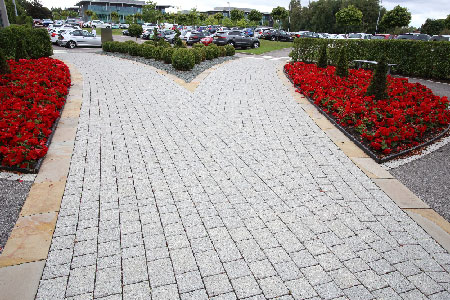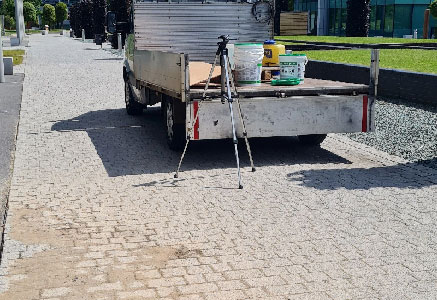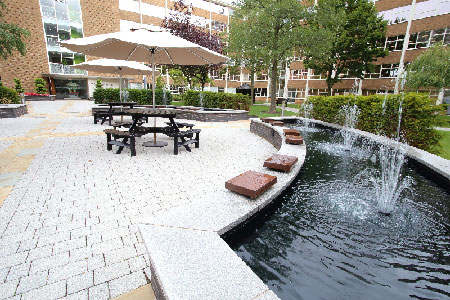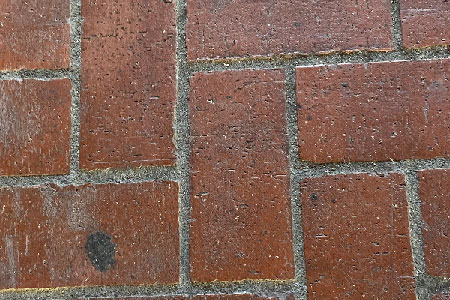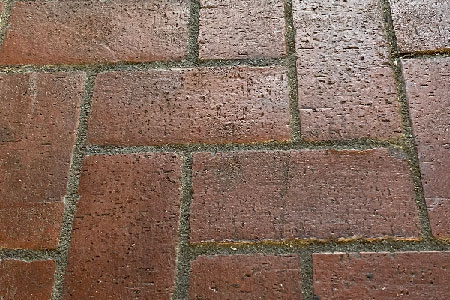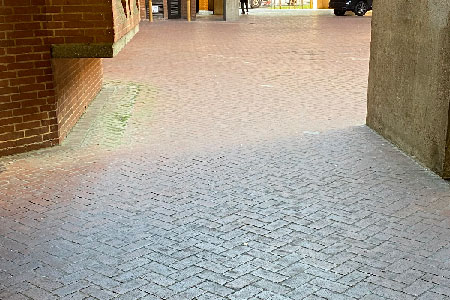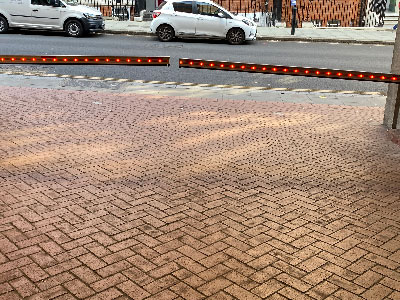Jointing for Unbonded ‘Flexible’ Block Paving - Online Shop
Unbonded block paving (so-called ‘flexible’ paving) is the basic form of paving jointing, where the paving elements / blocks are laid directly on compacted sand and aggregate subbase, to which they are not bonded or bedded in a cement mortar. The blocks are laid butt-jointed, with no defined joint spacing to accommodate a subsequent paving jointing mortar. Instead, the joints in unbound paving are backfilled with fine sand that is compacted so far as is possible by vibrating compaction of the surface. Unbound or ‘flexible’ block paving is obviously lower cost than bound paving with a built-up sub-structure and additional jointing materials applied, and it is widely used for areas such as large out-of-town retail and supermarket car parks, as well as for some domestic driveways and parking areas all around the UK. Concrete blocks that are ‘Butt-jointed’ usually form a gap between the units of around 2mm wide and the full depth of the blocks, so between a minimum of 50mm - 80mm deep for domestic paving, and 80mm to 100mm depth for commercial car park block paving.
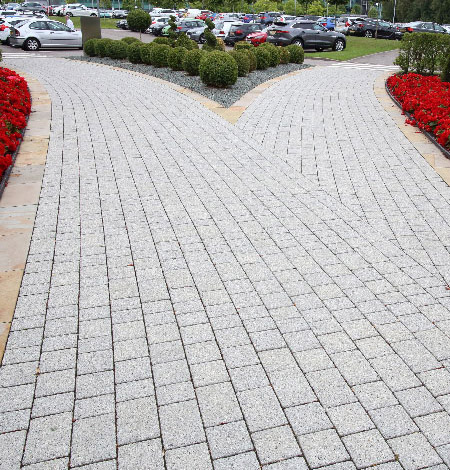
Flexible, unbonded and unbound paving is lower cost, and very popular for larger paved pedestrian and car parking areas
The size and nature of the joints between butt-jointed blocks is determined by the profile and uniformity of the paving units, with no bonding to the substructure or the adjacent units with bedding, respectively jointing mortars, the paved surface is relatively flexible and slight movement can take place across the surface to accommodate some settlement etc. This type of paving is probably one of the oldest known, before the Minoans and then the Romans developed pozzolanic cement-based materials for bonded paving. This is still a widely used approach, but now only suitable for concrete block paving with negligible joint widths and laid butt-jointed to the next element. The key advantages of unbound flexible paving and sand filled joints are obviously speed of application, and lowest labour and materials cost, as well as ease of removal and relaying e.g. for new pipe or cable works or drainage issues, but there are also disadvantages, including the increased risk of settlement, and the unfortunate ease of sand washing-out and weed growth.
However, these disadvantages can be at least partially negated, if not always eliminated, by using appropriate specialist jointing sands and/or surface treatments. There is more information on these systems in the Paving Joint Stabilisers page and in the relevant product pages for GftK vdw VarioSand and GftK vdw 870 Sand Stabiliser Solution pages.
In summary, flexible, unbonded and unbound paving also has a lot of design freedom with different coloured and sized blocks that can be used and integrated in traditional (e.g. Herringbone) or bespoke custom designs. Due to the reduced substructure and simpler build-up, unbound flexible block paving is much faster to install and has a much lower initial installation cost. For these reasons it is very popular for new build larger paved areas as stated, such as pedestrian and car parking areas from domestic driveways to the paving around shopping malls, retail centres and supermarkets, especially for extensive ‘out-of-town’ car parks. The block paving joints are usually filled with fine sand that is compacted in by vibration. Unfortunately, whilst this can work well for a few years, the sand is eventually leached out and weed growth develops to become a problem, requiring dirty and disruptive removal, treatment and refilling periodically.
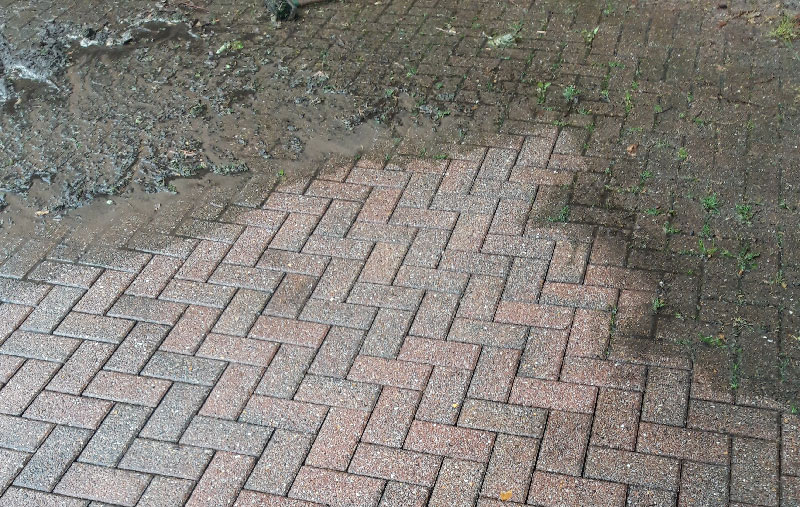
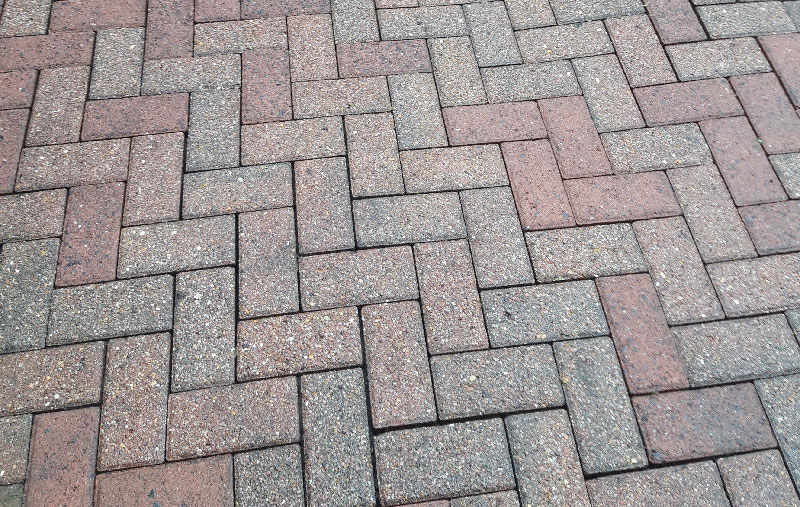
An Alternative Approach to Re-sanding Block Paving
An alternative approach to frequent and sometimes annual disruptive cleaning and re-sanding for established and settled block paving, has been developed and used very successfully by NCC Streetscape. This uses the unique characteristics and advantages of the latest GftK vdw 850+ jointing technology, including GftK vdw 815+ on the same basis for narrower joints from just 3mm wide.
This is obviously far more expensive initially in terms of the respective materials cost, than repointing with the traditional kiln dried sand. However, over the last 10 years, numerous field trials and test projects all around the UK, have very clearly demonstrated that this is a very cost effective, and far more sustainable solution. This is because of the dramatic increase in durability and longevity in service, due to the lack of repeat cleaning and re-sanding, less disruption and disturbance every 1 to 3 years or so.
One recent large commercial project in the Northwest of England at Birchwood Business Park in Warrington, involved repointing more than 8,000 square metres in annual phases since the successful field trials over the winter of 2017 showed the clear advantages. Another involved concrete brick paving in the London Borough of Kensington and Chelsea almost 9 years ago, with the pictures below taking recently in 2023 and 2014, all still sound and performing in these important public access areas.
Example – Birchwood Business Park, Warrington
Birchwood Business Park, Warrington - Flexible, unbound, granite, sandstone and concrete block paving, cleaned and repointed with GftK vdw 850+ / 815+ between 2017 and 2024, no further annual disruption for weed removal, weedkiller application, and no re-sanding required since.
Example – London Borough of Kensington and Chelsea
Kensington & Chelsea- Flexible, unbound paving, successfully repointed with GftK vdw 850 in 2014, pictures taken in 2024 – All performing well and will continue to do so with no annual weed removal and re-sanding etc.
For more information please refer to the GftK vdw 815+ and GftK vdw 850+ Product Pages and the references for these applications in our Project Case Studies pages.
Selecting the Right Paving Jointing Materials Technology & Product
As outlined above and on the other pages of this website, there is no universal paving jointing materials technology and no universal paving jointing product. The right paving jointing for your project depends on the key criteria and your specific requirements.
We have produced a Paving Jointing Project Checklist, which is designed to help you identify and confirm all the relevant selection criteria for each project, in terms of the type and size of area, paving, joints, the site for installation and the required exposure and performance in service, durability, cleaning regime, plus the ease of closure and ease of eventual repointing.
We have also produced the GftK Paving Jointing Product Selection Guide that you can use this with the Checklist for each project, to ensure you consider all revenant criteria and select the most appropriate paving jointing solution. Always be sure to consider ALL the key criteria and parameters for your paving project, to make the right technical and commercial decisions based on ALL the requirements.
For more advice or assistance with your specific paving project, please call 01257 266696 for FREE Expert Advice during normal office hours, or you can email us at any time to: sales@nccstreetscape.co.uk and we will get back to you just as soon as we can. Thank you.
You can call 01257 266696 for FREE expert advice and assistance on any aspect or type of paving joint mortars and pointing / grouting of paved surfaces in any way. – We are confident that we can help you to prevent or to resolve any paving joint problems or issues, saving you time and money on every single job!

